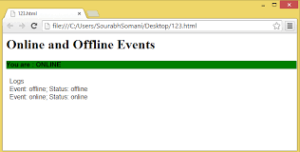Capabilities in Online HTML Compilers
An online html compiler is a web-based platform that provides developers with a virtual coding environment to write and test their HTML code. These programs typically offer features like real-time output display, accelerating the development process and providing immediate feedback. They eliminate the complexities of local installations and can be used from any computer with an internet connection.
When you first hear about offline capabilities in certain html compiler, it can sound like a contradiction of terms — after all, web pages are downloaded and rendered, which requires a network connection. However, it is possible to create a web application that can operate independently of a network and even save state locally in the case of losing a connection.

To make a web application work offline, it needs to be listed in a cache manifest file. A web browser will then read this file and download all the required resources (HTML, CSS, JavaScript, images, etc.). This caching is done on a per-file basis and happens just as it does for normal web pages. When you are back online, the local copies will be synchronized with the remote server and your application can continue to run as before.
Offline Capabilities in Online HTML Compilers
The good news is that this feature is supported by the majority of popular web browsers. However, you will still need to test your web application on multiple devices and platforms to ensure a consistent experience across them. Another consideration is the security of sensitive code and data. Although reputable Online HTML Compilers prioritize security measures, there is always an inherent risk when working in an online environment. Developers handling confidential or proprietary code may be wary of relying solely on online platforms, and in such cases, a balance between online and offline development tools may be preferable.
Furthermore, the collaborative nature of these platforms, while advantageous in many scenarios, can also pose challenges. Coordinating simultaneous edits, especially in larger teams, may lead to conflicts that need careful resolution. Features like version control and clear communication become paramount in ensuring a smooth collaborative experience.
Compatibility issues can also arise, particularly when dealing with complex projects that require specific dependencies or configurations. Online HTML Compilers may not always provide the same environment as local setups, potentially leading to discrepancies in code behavior. Developers need to be aware of these differences and, when necessary, test their code in a local environment to ensure compatibility.
Regardless of whether you are using an offline html compiler or not, the best way to develop HTML is with a robust HTML editor. This type of program allows you to easily create, edit and compile your HTML files with features like syntax highlighting, autocomplete and suggestions, code folding, and more. It is also important to choose an online HTML editor that supports collaboration features, allowing you and your colleagues to work on the same project simultaneously.
Fortunately, there are many great HTML editors to choose from. Notepad++, Komodo Edit, and Sublime Text are a few of the most popular, with each offering a clean user interface and a wide array of features. Visual Studio Code is more heavy-duty, working more like an IDE and is a great option for advanced developers who prefer a more comprehensive tool. Brackets and CoffeeCup are focused on HTML web development and are excellent choices for those who want a more dedicated solution.